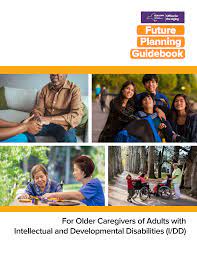Reference aims to help older adults caring for individuals with intellectual and developmental disabilities
For Developmental Disabilities Awareness Month in March, the state Office for the Aging presents a new resource guide for older adult caregivers of individuals with intellectual/developmental disabilities.
NYSOFA’s Future Planning Guidebook for Older Caregivers of Adults with I/DD is available online here. It connects older adult caregivers with information and resources to begin the process of long-term planning. This includes financial and legal tools, as well as supportive programs and services.
“If you are an older adult caring for an individual with intellectual or developmental disabilities, this guidebook is here to help, connecting you with vital information and resources,” said NYSOFA Director Greg Olsen. “In many cases, these services and options are available to people of all ages who are in a caregiver role. Please share this important resource today with anyone you know who could benefit.”
The resource guide was developed with support from the U.S. Administration for Community Living of the U.S. Department of Health and Human Services through the state Developmental Disabilities Planning Council.
“This guide is a welcome resource for older New Yorkers who care and plan for the lives of their loved ones with developmental disabilities,” said OPWDD Commissioner Kerri E. Neifeld. “Thank you to NYSOFA and the Developmental Disabilities Planning Council for creating this useful tool to help families explore the wide range of service options available through the Office for People with Developmental Disabilities and our provider network.”
“People with developmental disabilities are living longer and fuller lives with many wanting to remain in their current homes as they grow older,” said DDPC Executive Director Vicky Hiffa. “The DDPC was pleased to partner with NYSOFA to help ensure that caregivers and people with developmental disabilities have access to reliable resources as they age. This guidebook serves as a tool to help caregivers support aging adults with developmental disabilities to live with dignity and in a setting of their choosing.”
“Through my more than a decade of serving on the DDPC, it has been apparent that siloed services have created challenges for individuals with intellectual and developmental disabilities in accessing appropriate services as they age,” said NYSOFA Advocacy Specialist Colleen Scott. “With the expanding life expectancy of individuals with I/DDs, it is increasingly imperative that older adults have access to aging services. NYSOFA was thrilled to partner with the DDPC to bring training to the aging network and expand the network’s capacity to serve individuals with I/DD through this guidebook and other efforts.”
“Older caregivers have been doing tremendous work supporting friends or family living at home and in the community,” said Association on Aging in New York (AgingNY) Disability and Program Coordinator Kathryn Carroll. “This guide is an offer of support to them and disabled adults of all ages so that they can access essential services and plan effectively. We all deserve to age with dignity with the support we need.”
Older adult caregivers of individuals with I/DD
Approximately 1 million individuals aged 60 or older in the U.S. are providing care for an adult with I/DDs, such as autism, cerebral palsy or Down syndrome. As individuals with I/DDs experience longer life expectancy, their parents or other family members are also more likely to continue providing care later in life.
According to the National Institute of Child Health and Human Development (NICHD), I/DDs are differences usually present at birth and uniquely affect the trajectory of an individual’s physical, intellectual or emotional development. Many of these conditions affect multiple body parts or systems.
Intellectual disability starts any time before a child turns 18 and is characterized by differences with intellectual functioning or intelligence, which include the ability to learn, reason, problem solve, and other skills; and adaptive behavior, which includes everyday social and life skills.
The term “developmental disabilities” is a broader category of often lifelong challenges that can be intellectual, physical or both.
Additional resources
In addition to NYSOFA’s Future Planning Guidebook, see the following resources for further information:
- Services and supports provided by OPWDD or OPWDD service providers can help individuals live in the home of their choice; plus, find employment and other meaningful activities in which to participate.
- The Disability Information and Access Line (DIAL) is an easy way to get connected to the services you need. The line is available Monday through Friday from 8 a.m. to 9 p.m. Individuals can call, text or videophone to 888.677.1199.
- Independent Living Centers (ILCs) provide an array of services that assist New Yorkers with all disabilities to live fully integrated and self-directed lives.
